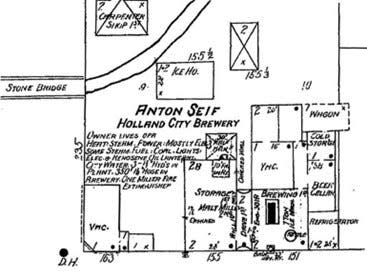Steve VanderVeen: Holland's pre-Prohibition movers and shakers
Anton Seif was Holland’s largest pre-prohibition brewer. It was a tough business.
Initially, Albertus Van Raalte had prohibited the sale of strong drink in the colony. In fact, when, in 1848, Jan Binnekant complained that strong drink was being sold, he forbade it.
More History: Holland founder was a 'social entrepreneur'
More History: Binnekant and Keppel were two of Holland's first merchants
More History: Holland's first mayor excelled at management
Later, the common council gave in, saying druggists could sell it during the “sickly season” for “medicinal purposes.” But demand was greater. The Holland City News reported that a proprietor was selling groceries at cost and making a profit by selling liquor in kerosene cans and vinegar jugs.
Attitudes toward beer were different. In Holland’s earliest colony days, the colony imported beer from Milwaukee and Schiedam, Netherlands. Then, in 1863, John Aling opened a brewery on River Avenue that produced 450 barrels per year.

In 1873, Carl Zeeb erected a brewery on the corner of Tenth Street and Maple Avenue. In 1874, Xavier Sutton and John Steiner bought the brewery — then Sutton bought out Steiner.
Drunkenness and abusive behavior was “verboten.” Across the country, a national temperance movement accelerated, and its target was saloons. In 1877, local supporters, led by Isaac and Caterina Cappon, pressured the city to regulate saloons, which reduced their number from sixteen to seven.
In 1881, the city closed saloons on the Fourth of July. This, according to the Holland City News, sent 75 or 80 people to Saugatuck. Then, in 1890, the state legislature passed a law that gave local districts the authority to prohibit the manufacturing and distributing of alcoholic beverages.
The town of Zeeland went “dry” for the next century. Holland, however, chose to stay “wet,” but immediately raised licensing fees to $250.
Against the temperance movement, Anton Seif prevailed — at least for a while. Seif, born in Germany in 1846, had immigrated to Milwaukee. He and his wife, Friedrika, then migrated to Holland and resided at 160 W. Tenth St. — where Seif joined Xavier Sutton.
In 1877, E.F. Sutton bought Xavier’s brewery, expanded it, paid off its debts, and brewed a beer equal to or better than the “celebrated Cincinnati lager beer” which had “hardly any intoxicating parts are left in it,” according to the Holland City News.
In 1879, Seif bought out Sutton. Two years later, Anton, Jr. was born. Soon thereafter, Friedrika began organizing Lutheran worship services.
In 1884, Seif opened a saloon. At the brewery, he tore down the frame building and made one of brick. He also added machinery, tubs and a cellar, and expanded production capacity to 4,000 barrels.
To keep his beer fresh year-round, he hired crews during the winter months to harvest and store ice from Black Lake. Using bobsleds and horses, men would drag blocks of ice up chutes to Tenth Street, where men slid it into an icehouse and covered it with sawdust and straw.
In 1888, the Seifs bought property at Maple Avenue and Twelfth Street for Zion Lutheran Church.
Seif also ran a bottling works and offered free delivery. The recently invented telephone aided his business. Possibly because of the Wall Street Panic of 1893 and the deep recession that followed, Seif sold his brewery to George Schoenith. But in 1898, Seif bought the business back and renamed it Holland City Brewery.

In 1903, Seif opened a saloon at 180 River Ave. and there sold “beer without a peer.” Then, in 1908, the city forbade the consumption of alcohol in saloons. In response, patrons bought bottled beer to consume outside, a practice they called “counting the stars.” They also formed private drinking clubs, such as the Pioneer Club.
Subscribe: Learn more about our latest subscription offers!
In 1916, Michigan voted to amend the state’s constitution to prohibit the making, selling and transporting of alcoholic beverages. In response, Seif converted the Holland City Brewery into a cheese factory. In 1919, Congress passed the 18th Amendment. Then, in 1920, the Prohibition became the law of the nation.
The cheese factory didn't last. Anton, Sr. sold the property, while Anton, Jr. found factory work as a phonograph inspector. He later became manager of Holland’s Standard Oil terminal.
Anton, Sr. died in 1934, one year after Congress repealed the Prohibition. Zion Lutheran Church is still with us.
Information for this article comes from Robert Swierenga’s "Holland, Michigan" — plus the Holland City News, oldbreweries.com, Holland and Zeeland City Directories and research from Alex Greczek in 2005.
— Community Columnist Steve VanderVeen is a resident of Holland. Contact him through start-upacademeinc.com.
This article originally appeared on The Holland Sentinel: Holland History: The area's pre-Prohibition movers and shakers
